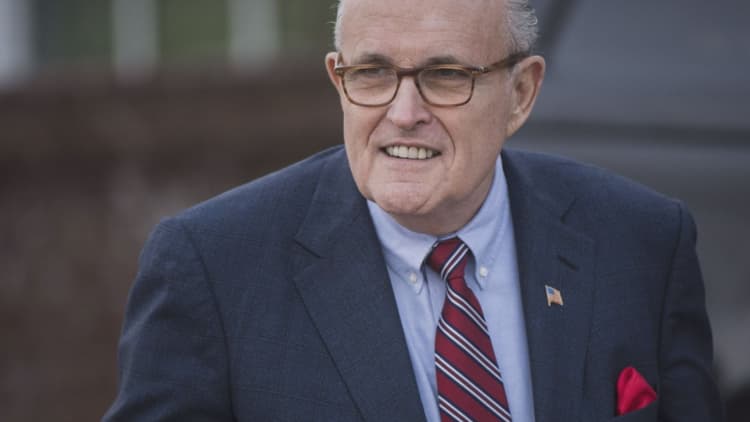
President Donald Trump's lawyer Rudy Giuliani sparked news headlines Monday morning by saying "collusion is not a crime."
The president himself weighed in Tuesday morning, echoing his lawyer's assertion.
But even if that's true, it won't help the president.
Giuliani and Trump are correct, technically speaking, that there is no charge called "collusion" that can be found in the federal criminal code.
And given that, Giuliani went on to say, then it doesn't matter if Trump or members of his presidential campaign actually "colluded" with Russians to interfere in the 2016 election.
But here's the problem for Giuliani: Special counsel Robert Mueller, who is investigating possible "collusion" by members of the Trump campaign with Russians during the 2016 presidential election, has a number of possible criminal statutes that he could cite to charge such collusive conduct or a cover-up thereof, none of which rely on the word "collusion."
Instead, those statutes contain words such as "conspiracy," "obstruction of justice" and making "false statements."
And Mueller has the power — which he has repeatedly used since he was appointed in May 2017 — to charge people with crimes that are not related in any way to "collusion."
In fact, he has obtained guilty pleas to various crimes unrelated to collusion from Trump's former national security advisor Michael Flynn, Trump campaign official Rick Gates and campaign advisor George Papadopoulos.
Mueller also has pending indictments against Trump's former campaign chairman Paul Manafort that are not linked to collusion. He also has obtained indictments against 25 Russians accused of interfering in the election by hacking and social media "warfare."
Trump and his surrogates have repeatedly sought to delegitimize the special counsel's investigation by saying there was "no collusion" and calling the special counsel's probe a "witch hunt."
But Giuliani's comments on Monday — which came a day after Trump backer and former New Jersey Gov. Chris Christie said, "Collusion is not a crime" — represent a new stage in the anti-Mueller public relations battle.
The two former federal prosecutors now suggest that because there is no law explicitly making "collusion" illegal, then a person can't be prosecuted for actions that constitute collusion.
However, Giuliani's and Christie's former employer, the U.S. Justice Department, doesn't agree with them.
When Rod Rosenstein, the acting U.S. attorney general for purposes of investigations related to Russian election interference, appointed Mueller in May 2017, he made it clear that Mueller's first order of business was to investigate possible collusion by the Trump campaign.
"The Order authorized you to conduct 'the investigation confirmed by then-FBI Director James B. Comey in testimony before the House Permanent Select Committee on Intelligence on March 20, 2017, including: (1) any links and/or coordination between the Russian government and individuals associated with the campaign of President Donald Trump," Rosenstein noted in an Aug. 2, 2017, memo to Mueller.
The memo went on to say that Mueller was also tasked with investigating "(2) any matters that arose or may arise directly from that investigation."
If the words "links" and "coordination" are not close enough to collusion, Rosenstein went further in that same memo, when he explicitly laid out allegations against former Trump campaign chief Manafort, which Rosenstein said "were within the scope of the Investigation at the time of your appointment and are within the scope of the Order."
Those allegations are "that Paul Manafort: Committed a crime or crimes by colluding with Russian government officials with respect to the Russian government's efforts to interfere with the 2016 election for President of the United States, in violation of United States law."
Manafort hasn't actually been charged with such a crime related to his work on the Trump campaign.
Instead, he was indicted, in two separate federal cases, on charges stemming from his consulting work for a pro-Russian political party in Ukraine, which pre-dated his role on the campaign.
Rosenstein's memo said those charges are covered by the order authorizing Mueller's appointment — since they stemmed from "any matters that arose" from the investigation.
Manafort's lawyers asked a federal judge to toss out one of the cases, based on a claim that the special counsel had exceeded the scope outlined by Rosenstein in the appointment order.
That argument flopped.
And now Manafort is set to go on trial Tuesday in federal court in Virginia, several miles from the White House, where his former boss Trump has sent out tweets claiming, "no collusion!"


